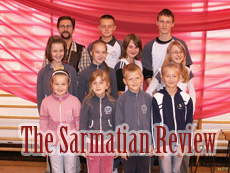| This Issue | Back Issues | Editorial Board | Contact Information |

Our Take
January 2010
Volume XXX, No. 1
Christopher Zakrzewski has completed a new prose translation of Adam Mickiewicz’s Pan Tadeusz [1834]. In September 2008 Sarmatian Review published Book Two of his translation; this issue contains Book One, perhaps the best-known and most beloved part of this poem. In his comments on the translation, Professor Zakrzewski remarked that it took him a long time to discover that Pan Tadeusz translates best into prose rather than the iambic pentameter in which it originally was written. We concur. Like all truly great works of literature, Pan Tadeusz can be read in many ways. A prose rendition makes its page-turning plot come forth, wrapped in gentle romantic irony. We shall publish the subsequent books as space permits.
Professor Marek Troszyński’s article was read at the International Herbert Conference in Warsaw, May 10–12, 2008. It is one of those rare texts that makes the reader shout eureka! Why hasn’t someone noticed this before? Troszyński came up with the idea that the Mickiewicz-Słowacki relationship from almost two centuries ago finds a parallel in the Miłosz-Herbert relationship in the twentieth century. Indeed, Mickiewicz and Miłosz tend to gloss over the thorny side of colonialism in Poland, whereas Słowacki and Herbert never come to terms with it. The tone of Herbert’s “Mr. Cogito’s Envoy” is totally alien to Miłosz’s poetry; the serenity of the Polish country manor in Pan Tadeusz could never have been conjured up by Słowacki. Perhaps the difference between two major parties in Poland, PO and PiS, with their bitter and unseemly hostilities, can also be described in terms provided by Professor Troszyński.
We are honored to have Professor Anne Barbeau Gardiner review the first modern translation into English of the odes and epigrams of Casimir Britannicus (a.k.a. Kazimierz Maciej Sarbiewski). Sarbiewski wrote in Latin, and his popularity among both Catholics and Protestant in England remains something of a mystery. We are also delighted to present a review of the first English translation of Stefan Žeromski’s Przedwiośnie (The Coming Spring). The translation by Bill Johnston (who also translated Žeromski’s The Faithful River) is the first step in integrating this great novelist into mainstream history of the novel. The Memoirs of Joseph Conrad’s uncle’s are reviewed by Joanna Rostropowicz Clark; much can be learned from the book and from the review. Finally, a book about the “Sarmatian” literature of seventeenth-century Poland is reviewed by Professor Anna Nowicka-Struska.
Back to the January 2010 Issue
The Sarmatian Review
sarmatia@rice.edu
Last updated 3/13/2010